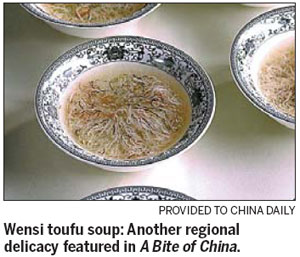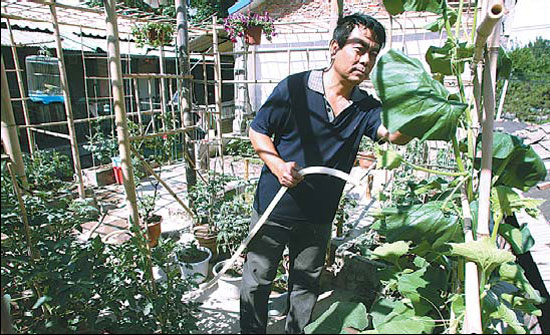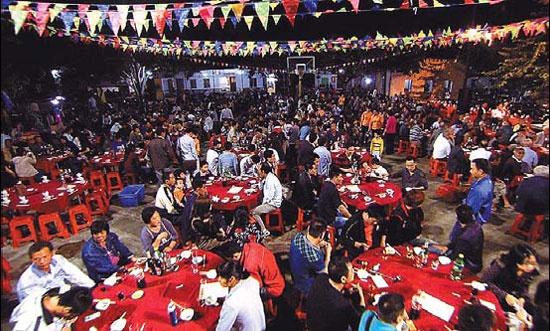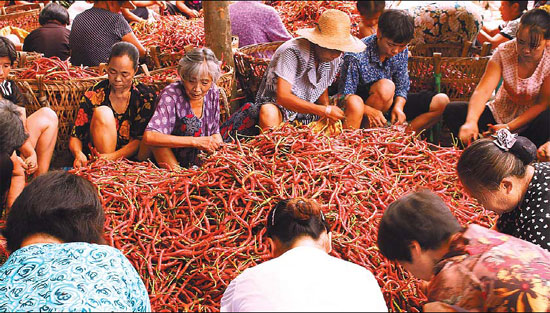Life-changing awakening
Updated: 2013-01-09 07:25
By Ye Jun (China Daily)
|
||||||||
|
Zhang Guichun tends his rooftop vegetable garden in Beijing. Li Gang / For China Daily |
|
Village banquets in Shunde, Guangdong province were highlighted in A Bite of China. Provided to China Daily |
|
The documentary raised awareness of many regional cooking ingredients like these red peppers from Sichuan. Zhao Xia / For China Daily |
A television documentary series brought China back to its culinary roots last year, and changed some lives forever. Ye Jun looks back at the ripple effects of A Bite of China.
On Jan 10, shooting will begin on part two of A Bite of China, the television documentary telecast in 2012 that woke up the nation's taste buds and sent people scrambling online to search out regional delicacies.
Chen Xiaoqing, the executive producer of the series, says the new series of A Bite of China will be completed by the end of this year, if it follows schedule.
While the China Central Television (CCTV) crew is out scouring the country for more food tales, the stars of the last series are still enjoying their celebrity status half a year after their episodes were aired.
Beijinger Zhang Guichun, 55, was happily enjoying his retirement after he gave up his restaurant business. In his free hours, he would trade some stocks and indulge in a new hobby. It was this hobby that finally earned him fame as a TV celebrity.
In May 2012, Zhang's rooftop garden appeared on the seventh and last episode of A Bite of China, and his home-grown vegetables appeared on national television. It propelled him into the limelight and soon, strangers were coming to visit his garden and asking him for advice on how they, too, can cultivate vegetables on rooftops.
He has been invited to appear on many major television programs, especially near the end of the year.
"There was not a day when I didn't receive visitors from all over the country," Zhang says. He has just finished appearing on a few television programs at provincial and Beijing TV stations, and three more channels are waiting.
"I feel happy and proud to appear on TV. It's an honor, and satisfies my vanity," he says.

Where people usually plant flowers, Zhang had planted a variety of vegetables - melons, pumpkin, tomato and eggplant.
As a member of the Roof Gardens Association, Zhang says his rooftop vegetable garden has inspired a lot of people in China to cultivate gardens on their rooftops.
Many come to learn from him.
"People want to return to Nature, and they aspire to be urban farmers," he says. "There used to be virtual vegetable planting games on the Internet, but now people prefer the real thing."
A Bite of China also awakened a renewed appreciation of traditional and regional Chinese foods since it aired in May.
People not only got to know many ingredients previously used only locally, and they were warmed by the strong bonds that link Chinese food, family and hometown.
Bian Jiang, secretary-general of the China Cuisine Association, says the documentary is about Chinese food, but goes beyond food in that it also expressed Chinese culture and identity.
"The documentary takes people back to where they feel happiest: To home-cooked food, to mother's cooking.
At the same time, it also showcases regional foods, the best memories for the hundreds of thousands of Chinese people who have traveled far from their hometowns to work and live in the cities," he says.
The documentary motivated buying sprees on the Internet - for Yunnan's black truffles and its Nuodeng ham, and Jianshui's fermented bean curd. The country's biggest Internet business portal reported increased transactions of produce that had been featured on the documentary.
Regional cuisine styles such as those from Yunnan and Anhui provinces became more popular, and many restaurants borrowed the catch phrase from the TV series by boasting about "A Bite of Hangzhou", or "A Bite of Henan".
Xibei Oats Village, a northwest Chinese specialist restaurant, has appointed Huang Guosheng as its image ambassador.

Huang is a country farmer and millet bread baker who had appeared in A Bite of China. The episode showed him milling the flour, kneading the dough and steaming the bread before cycling to the nearest city with his freshly made buns.
Chain restaurant Xibei paid him 300,000 yuan ($48,116) as its spokesman, and invited him to teach its chefs how to make his millet bread, now available at all its outlets in the country at 3 yuan per loaf.
Although some critics say millet bread is only authentic in northern Shaanxi, where Huang comes from, Huang seems to have benefited from the deal.
He said he would build a big house with the money, so his family members can all live under one roof.
Chong Zhanming, who determines the professional skills of chefs in Beijing, says A Bite of China has inspired a love for traditional food while deepening the understanding of regional ingredients among chefs.
Bian Jiang says that the TV series was so successful because it puts human faces to the food stories.
"The Chinese attitude to food has changed, a reflection of better living conditions. People have gone from just feeding a hunger to gourmet enjoyment," Bian says. "That is why restaurants need to raise the cultural connections and quality of food to satisfy customers."
(China Daily 01/09/2013 page18)

 In Photos: 7.0-magnitude quake hits Sichuan
In Photos: 7.0-magnitude quake hits Sichuan
 Li Na on Time cover, makes influential 100 list
Li Na on Time cover, makes influential 100 list
 FBI releases photos of 2 Boston bombings suspects
FBI releases photos of 2 Boston bombings suspects
 World's wackiest hairstyles
World's wackiest hairstyles
 Sandstorms strike Northwest China
Sandstorms strike Northwest China
 Never-seen photos of Madonna on display
Never-seen photos of Madonna on display
 H7N9 outbreak linked to waterfowl migration
H7N9 outbreak linked to waterfowl migration
 Dozens feared dead in Texas plant blast
Dozens feared dead in Texas plant blast
Most Viewed
Editor's Picks

|

|

|

|

|

|
Today's Top News
Live report: 7.0-magnitude quake hits Sichuan, heavy casualties feared
Boston suspect cornered on boat
Cross-talk artist helps to spread the word
'Green' awareness levels drop in Beijing
Palace Museum spruces up
First couple on Time's list of most influential
H7N9 flu transmission studied
Trading channels 'need to broaden'
US Weekly

|

|










